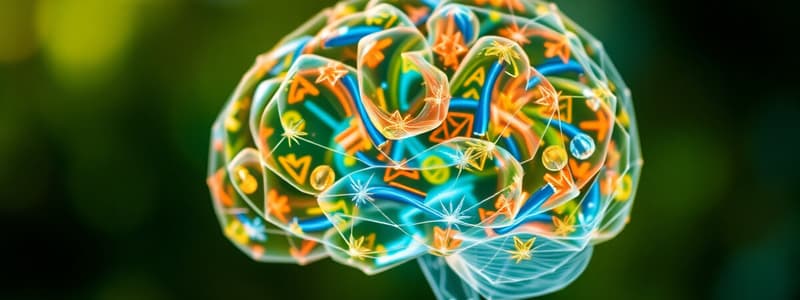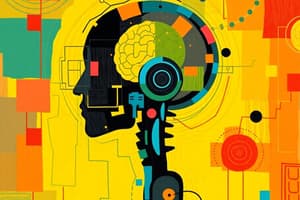Podcast
Questions and Answers
What is a key concept of traditional cognition regarding how representations are stored in the brain?
What is a key concept of traditional cognition regarding how representations are stored in the brain?
- Representations are exclusively located in the sensory regions.
- Representations are correlated with emotional responses.
- Representations are stored away from the sensory and motor regions of the brain. (correct)
- Representations are developed solely through language processing.
How does embodied cognition differ from traditional cognition in terms of brain activation?
How does embodied cognition differ from traditional cognition in terms of brain activation?
- All cognitive processes in embodied cognition activate the same brain regions. (correct)
- Embodied cognition relies on abstract representations stored in the prefrontal cortex.
- Cognitive functions in traditional cognition rely more on sensory integration.
- Embodied cognition activates different regions for thinking, looking, and interacting.
What does the concept of 'mental simulation' in embodied cognition refer to?
What does the concept of 'mental simulation' in embodied cognition refer to?
- The engagement of sensory and motor systems during cognitive processes. (correct)
- The practice of visualizing abstract concepts removed from sensory experience.
- The ability to recall past experiences without sensory input.
- The process of forming new mental representations through verbal reasoning.
Which statement describes how priming works in the context of embodied cognition?
Which statement describes how priming works in the context of embodied cognition?
What is suggested about the interaction between cognition and the environment in the context of embodied cognition?
What is suggested about the interaction between cognition and the environment in the context of embodied cognition?
What do body-mind effects suggest about the relationship between holding an object and perceiving stimulus objects?
What do body-mind effects suggest about the relationship between holding an object and perceiving stimulus objects?
What was the key finding from the study by Tucker & Ellis regarding mind-body effects?
What was the key finding from the study by Tucker & Ellis regarding mind-body effects?
In the study by Witt & Brockmore, what was observed when subjects interacted with a gun versus a neutral object?
In the study by Witt & Brockmore, what was observed when subjects interacted with a gun versus a neutral object?
What does embodied cognition argue regarding sensory and motor systems?
What does embodied cognition argue regarding sensory and motor systems?
What effect was observed in Helbig et al.'s study regarding action observation?
What effect was observed in Helbig et al.'s study regarding action observation?
How do body and mind influence cognition according to the summary of findings?
How do body and mind influence cognition according to the summary of findings?
Regarding predictions about observed actions, what effect is anticipated?
Regarding predictions about observed actions, what effect is anticipated?
What does the concept of mental simulation in cognition refer to?
What does the concept of mental simulation in cognition refer to?
What does the concept of embodied cognition suggest about representations within the brain?
What does the concept of embodied cognition suggest about representations within the brain?
How does interaction with the environment impact cognition in the context of embodied cognition?
How does interaction with the environment impact cognition in the context of embodied cognition?
Which statement best characterizes the process of mental simulation in embodied cognition?
Which statement best characterizes the process of mental simulation in embodied cognition?
In the context of embodied cognition, what happens when one part of an object's representation is activated?
In the context of embodied cognition, what happens when one part of an object's representation is activated?
What is a critical difference between traditional cognition and embodied cognition regarding brain activation?
What is a critical difference between traditional cognition and embodied cognition regarding brain activation?
What do body-mind effects indicate about the relationship between holding an object and perception?
What do body-mind effects indicate about the relationship between holding an object and perception?
In the study conducted by Tucker & Ellis, what was the main factor affecting the difficulty of the response action?
In the study conducted by Tucker & Ellis, what was the main factor affecting the difficulty of the response action?
What is a predicted outcome when observing someone's action?
What is a predicted outcome when observing someone's action?
Which element do body and mind effects suggest is essential in understanding cognition?
Which element do body and mind effects suggest is essential in understanding cognition?
What finding was observed regarding the bias for reporting objects in the Witt & Brockmore study?
What finding was observed regarding the bias for reporting objects in the Witt & Brockmore study?
What does embodied cognition argue about the nature of cognition?
What does embodied cognition argue about the nature of cognition?
Which conclusion about embodied cognition can be drawn from the studies discussed?
Which conclusion about embodied cognition can be drawn from the studies discussed?
What effect was indicated when subjects interacted with a gun in Witt & Brockmore's research?
What effect was indicated when subjects interacted with a gun in Witt & Brockmore's research?
Flashcards
Embodied Cognition
Embodied Cognition
Cognitive processes are grounded in sensory and motor experiences, with representations distributed across these systems, eliminating the need for separate mental representations.
Traditional Cognition
Traditional Cognition
Thinking, looking, and interacting with an object activate different brain areas, with representations separate from sensory and motor regions.
Mental Simulation (Embodied Cognition)
Mental Simulation (Embodied Cognition)
Mental simulation in embodied cognition involves recreating perceptual and motor experiences.
Distributed Representations (Embodied Cognition)
Distributed Representations (Embodied Cognition)
Signup and view all the flashcards
Priming in Embodied Cognition
Priming in Embodied Cognition
Signup and view all the flashcards
Body-mind effects
Body-mind effects
Signup and view all the flashcards
Mind-body effects
Mind-body effects
Signup and view all the flashcards
Action observation
Action observation
Signup and view all the flashcards
Stimulus-response compatibility
Stimulus-response compatibility
Signup and view all the flashcards
Priming effect
Priming effect
Signup and view all the flashcards
Mental Simulation
Mental Simulation
Signup and view all the flashcards
Overlapping neural structures
Overlapping neural structures
Signup and view all the flashcards
Distributed Representations
Distributed Representations
Signup and view all the flashcards
Study Notes
Traditional vs. Embodied Cognition
- Traditional cognition: Separates thinking, looking, and interacting with objects, each activating different brain regions. Representations are stored separately from sensory and motor areas.
- Embodied cognition: Posits that perception, action, and cognition are intertwined. Thinking, looking, and interacting with objects result in the same brain activations. Representations are distributed across sensory and motor systems, implying "mental simulation".
Priming and Representations
- Embodied cognition emphasizes that activating one aspect of an object's representation (e.g., the concept of a cat) can activate related components (e.g., the feeling of touching a cat).
- Predictions: activating motor aspects of an object should prime memories of actions related to that object ("body-mind effects"). Activating sensory aspects should prime associated actions ("mind-body effects").
Body-Mind Effects (Witt & Brockmore, 2012)
- Subjects held an object (gun or ball) and responded to object stimuli.
- The experiment varied the response direction (raising or lowering the held object) based on the presence or absence of a gun in the stimulus.
- Results showed that holding the gun influenced the perception of the stimulus, affecting the ease of making a judgment about it. The effect wasn't specific to guns; holding any object altered perception.
Mind-Body Effects (Tucker & Ellis, 2004)
- Subjects viewed pictures of objects (small or large, natural or man-made).
- They judged object type using a response switch requiring either precision or power grip.
- Compatible conditions (e.g., small/natural object - precision grip) were faster than incompatible conditions (e.g., small/natural object - power grip).
- Perceiving an object activated related manual handling information, influencing the response.
Action Observation and Representation (Helbig et al., 2010)
- Participants observed videos of hand actions.
- Simultaneously, pictures of objects connected to the action appeared and they judged object category.
- Congruent (e.g., hand grasping a cup) trials were faster compared to incongruent trials.
- Observing an action primes perceptual/motor representations related to the action making it easier to identify related objects.
Summary of Embodied Cognition
- Embodied cognition argues that cognition is founded on sensory and motor interactions.
- Cognitive processes like perception, action, imagination, and observation utilize shared neural structures.
- "Mental simulation" plays a critical role.
- Body and mind constantly influence each other.
- The physical body's structure and capabilities actively shape mental processes.
Studying That Suits You
Use AI to generate personalized quizzes and flashcards to suit your learning preferences.




